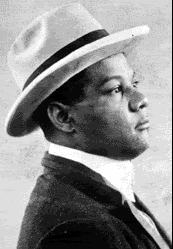
Like most of his contemporaries, Bechet headed for the bright lights of Chicago and hooked up with Clarence Williams, Freddie Keppard and King Oliver. He was one of the first musicians to see the rising popularity of jazz in Europe and so travelled to France and Britain in the early 20's, to great acclaim. He appears to have been something of a wild man and was deported back to the States after an altercation with the law. Back in the States, with a soprano sax in tow that he had picked up in London, he eventually began working again with Clarence Williams and making his first recordings.
It is in these recordings made from 1923 to 1925 that Bechet's musicianship can be seen. The vibrato that emanates from his clarinet and sax could be seen as both violent and extremely soulful. It's safe to say that no-one at the time had heard anything like it. The influence of the blues can clearly be heard in his playing and he is happy to push the boundaries away from the ensemble style of jazz that was prevelant at the time. In fact these recordings were made a few months before Louis Armstrong and King Oliver made their seminal jazz recordings in Richmond, Indiana.
Here are the first recordings, "Wild Cat Blues" and "Kansas City Man Blues". Note Bechets' dominance on these tracks.
However it should be noted that Bechet and Armstrong were actually friends and knew each other from their early days in New Orleans. Luckily for us Clarence Williams had the nous to organise a recording session involving both of them in what one Bechet biographer has termed the "Duel of the giants". I personally dislike the term. What I hear in these recordings are two artists who have great respect for each other but are willing to push each other on and get the ultimate out of their instruments. As we have seen before, Louis Armstrong was no shrinking violet even in the presence of his mentor, King Oliver.
Here's "Texas Moaner Blues". It opens with Bechet on the clarinet. Armstrong's cornet solo is typically strong and lays down the challenge to Bechet's soprano sax for the final bars.
"Mandy Make Up Your Mind". The only known jazz song with a sarrusophone solo - a kind of cross between a bassoon and a bass saxophone. This musical oddity was primarily used in the pre electic era as a replacement for the double bass which was difficult to hear and record. Bechet gives it a go!
Finally, check out "Cake Walkin' Babies From Home", another great example of how well the two pioneers in jazz gelled so well.
Unfortuantely Bechet was not to record again for the rest of the 20's. He became briefly involved with Duke Ellington's Washingtonians band but his wanderlust appears to have been insatiable. He travelled on from the States to Europe to play in France, Britain and as far as Russia. He wasn't to achieve the success that Louis Armstrong enjoyed in America but he was highly regarded in Europe, particularly in France, where he eventually settled. His influence in jazz is considerable - from Benny Carter, Johnny Hodges, Coleman Hawkins, John Coltrane and beyond.
No comments:
Post a Comment